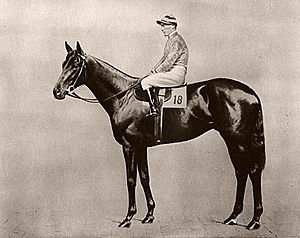Steve Donoghue facts for kids
Quick facts for kids Steve Donoghue |
|
|---|---|

Steve Donoghue on The Derby winner, Manna
|
|
| Occupation | Jockey |
| Born | 8 November 1884 Warrington, Lancashire, England |
| Died | 23 March 1945 London |
| Major racing wins | |
| British Classic Race wins as jockey: 2000 Guineas (3) 1000 Guineas (1) Epsom Derby (6) Epsom Oaks (2) St Leger Stakes (2) |
|
| Racing awards | |
| British flat racing Champion Jockey 10 times (1914, 1915, 1916, 1917, 1918, 1919, 1920, 1921, 1922, 1923) | |
| Significant horses | |
| The Tetrarch, Pommern, Gay Crusader, Humorist, Captain Cuttle, Papyrus, Manna, Brown Jack, Exhibitionnist | |
Steve Donoghue (born November 8, 1884 – died March 23, 1945) was a very famous English jockey. He rode horses in flat races, which are races on a flat track, mostly in the 1910s and 1920s. Steve was the best jockey in Britain for ten years in a row, from 1914 to 1923. Many people think he was one of the greatest jockeys ever, right up there with legends like Fred Archer and Sir Gordon Richards.
Contents
Early Life and Start in Racing
Stephen Donoghue was born in Warrington, Lancashire, England. His dad worked with steel, and his family had no connection to horse racing. When he was twelve, Steve left home. He decided to become a jockey after he won a prize for riding a donkey at a circus.
At 14, Donoghue started training with a famous horseman named John Porter. He later worked at other stables in Britain. In 1905, he won his first race in France. He then moved to Ireland in 1907, before coming back to England in 1911.
A Champion Jockey's Career
In England, Donoghue became the main jockey for Henry Seymour "Atty" Persse. He had his first big wins in 1913 on a great young horse called The Tetrarch. The next year, he won 129 races. This made him the best jockey in Britain for the first time. He kept this title for ten years straight!
Winning the Derby Six Times
Steve Donoghue's biggest wins were in The Derby race. He won this famous race six times! His three wins in a row in the early 1920s were very special. He won with Humorist in 1921, Captain Cuttle in 1922, and Papyrus in 1923.
He was also well-known for riding a horse named Brown Jack. Steve rode Brown Jack to win the Queen Alexandra Stakes at Royal Ascot six times in a row.
Double Triple Crown Winner
In 1915 and 1917, Steve rode two horses, Pommern and Gay Crusader, to win the English Triple Crown. This is a very rare achievement in horse racing. A horse wins the Triple Crown by winning three specific big races in the same year.
Out of all the jockeys who have won the Triple Crown in over 200 years, Steve Donoghue is the only one to have won it twice!
Popularity and Style
Steve Donoghue was always liked by the public and other jockeys. He was known for being fair and was never punished by race officials. However, some horse owners and trainers found him a bit tricky. He would sometimes switch to ride a different horse if he thought it had a better chance to win.
Life After Racing
Steve Donoghue stopped riding horses in 1937 when he was 52 years old. In that same year, he won two more big races on a female horse named Exhibitionnist. He also appeared as himself in a movie called Wings of the Morning. This was Britain's first film made with Technicolour.
After retiring, Steve tried training horses, but he did not have much success. He passed away in London on March 23, 1945, from a heart attack.
In 1999, a newspaper called the Racing Post ranked Steve Donoghue as the fourth best jockey of the 20th century.
Major Race Victories
- Epsom Derby winners:
- 1915: Pommern
- 1917: Gay Crusader
- 1921: Humorist
- 1922: Captain Cuttle
- 1923: Papyrus
- 1925: Manna
- 1,000 Guineas winner:
- 1937: Exhibitionnist
- 2,000 Guineas winners:
- 1915: Pommern
- 1917: Gay Crusader
- 1925: Manna
- Epsom Oaks winners:
- 1918: My Dear
- 1937: Exhibitionnist
- St. Leger Stakes winners:
- 1915: Pommern
- 1917: Gay Crusader
Other Interests
Outside of horse racing, Steve Donoghue also owned greyhound dogs. He was one of the first people to enter his greyhounds in races at the new Ensbury Park Racecourse.
 | Emma Amos |
 | Edward Mitchell Bannister |
 | Larry D. Alexander |
 | Ernie Barnes |

